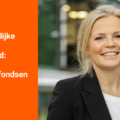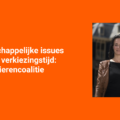It sounds obvious, but we have had a year in which issues arose and issues went away. Sometimes these were issues that happened to us and sometimes issues that were consciously put on the map by ourselves or others. Sometimes we had to deal with broader social issues, sometimes company-specific.
Yellow vests, the ban on texting in traffic, the child pardon, dividend tax, significant salary increases, closing hospitals, energy transition, integrity problems, nuclear energy as an alternative energy source, loneliness among the elderly, plastic packaging, vaccination, stress and burnout among young people. Just to name a few. What all these issues have in common is that they have determined or continue to determine the social and political debate for a short or longer period of time. And that one or more parties were often identified who - rightly or wrongly - were blamed.
Could this discussion have been prevented? Perhaps not. Did it seem as if a number of organizations had closed their eyes to what was going on in society? Perhaps. Was it a missed opportunity? Certainly.
What these issues have in common is that they often announce themselves well in advance. And that is precisely the reason for an organization to think carefully about which issues are important to you and how you can get a better handle on the impact you have or are making.
A well-executed issues policy helps organizations make the right choices. To restore, strengthen or maintain their reputation. Also in 2019. Perhaps even more than in recent years, because Dutch people increasingly expect organizations to take up their social role and make it clear if in their opinion this is not happening enough.
Would you like to know which issues we expect to be at the top in 2019? On January 24, we will present – together with Kantar Public – the Issues-to-watch during our Issue Congress, an overview of the issues that, according to the Dutch population, will or should dominate the agenda in 2019. If you would like to attend, please let us know.






